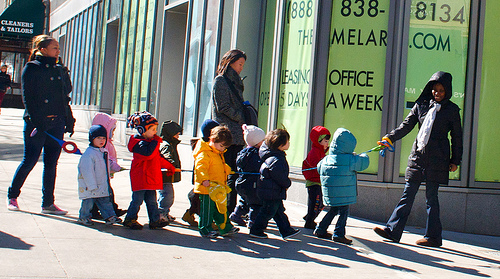Many of our leaders and even some of our neighbors think that strong local neighborhoods are "nice," a luxury if you have the spare time, but not really essential. There is growing evidence that strong neighborhoods and communities are not just good to have, but are necessary, especially in difficult times. This becomes clear when institutions and services are shrinking or have done all they can.
No matter how hard they try, our very best institutions cannot do many things that only we as citizens and neighbors can do. Even worse, our great corporate, governmental, professional and academic institutions often say to us, "You are inadequate, incompetent, problematic or broken. We will fix you."
Fixing people, providing services based on needs and deficiencies, just creates dependency. The alternative is a strong local community with powerful families and neighborhoods who accept the challenge of supporting citizens to find their own way, to craft a future of their own making.
Our neighborhoods are abundant with the resources we need to create a full and complete life. We already have all that is necessary to take care of our concerns about health, safety, economic well-being, the environment, food and nutrition, child rearing and care for the vulnerable. These are the domains of a satisfied life that only we as citizens and neighbors can fulfill.
Health
First of all, our health is in our own hands and neighborhoods are the primary source of our health. How long we live and how often we are sick are mainly determined by our personal behaviors, our social relationships and our physical environment. Our neighbors have a place in providing the social support and connectedness that we need to act on what we know to be healthy. Medical systems and doctors cannot provide these things.
Safety and Security
Many studies show that there are two major determinants of our local safety. One is how many neighbors we know by name. The second is how often we are present and together with one another in the public areas outside our houses. Police activity is a minor protection compared to these two community actions.

The Environment
As we learn more and more about the ecology of our world, the interconnectedness of everything is clearer. Each level of society has its role in preserving the web of life. At the neighborhood level, our decisions about how we transport ourselves, how we heat and light our homes and how much waste we create are major factors in saving our earth.
An Enterprising Local Economy
Most enterprises begin locally -- in garages, basements and dining rooms. The neighborhood is the birthplace and home of small business. Local enterprises are the most reliable sources of jobs. And small business is what provides the largest employment growth in the country. As neighbors, we have the local power to nurture and support these businesses so that they have a viable market. And we have the local power to put our money in credit unions and local community financial establishments so that we are not captives of our notorious large financial institutions.
Food and Nutrition
One of our responsibilities as citizens concerns the food we produce and consume. It is healthy to be mindful of what we eat. There are the environmental and climate concerns about how food is produced and the energy required for cultivating large farms and transporting food over long distances. So we ally ourselves with the local food movement, supporting local producers and markets and doing our part to solve the energy problem caused by transportation of food from continents away.
The Well-Being of Children
We all say that it takes a village to raise a child. And yet, in modernized societies, this is rarely true. Instead, we pay systems to raise our children -- teachers, counselors, coaches, youth workers, probation officers, nutritionists, doctors, McDonald's and MTV. There is no "youth problem" here. There is a village problem of adults who have forgone their responsibility and capacity to join their neighbors in raising the young. Our children do not need school reform, they need neighbors who know their names and teach them to be citizens.
Care for the Vulnerable
Institutions offer services, not care. Care is the freely given commitment from the heart of one to another; it cannot be purchased. The place to look for care is in the dense relationships among neighbors and their community groups. As neighbors, we care for each other. We care for our children. We care for our elders. We care for those on the margin. And it is this care that is the basic power of a community of citizens.
All these things are what competent communities and functional neighborhoods are needed for and can do. They use all their capacities and discover that what truly constitutes satisfaction is always close at hand, albeit at times invisible in the glare and promotions of the consumer society. Neighbors have the capacity to know what we need. What we need are the gifts that surround us. What we need is each other. And when we act together, we will find the community way. The democratic way. We are called to nothing less. And it is not so wild a dream.
***
This piece is adapted from "The Abundant Community: Awakening the Power of Families and Neighborhoods."
John McKnight is emeritus professor of education and social policy and co-director of the Asset-Based Community Development Institute at Northwestern University. He is the co-author of "Building Communities from the Inside Out" and the author of "The Careless Society." He has been a community organizer and serves on the boards of several national organizations that support neighborhood development.
Peter Block is founder of Designed Learning. They are coauthors of "The Abundant Community: Awakening the Power of Families and Neighborhoods (Berrett-Koehler).